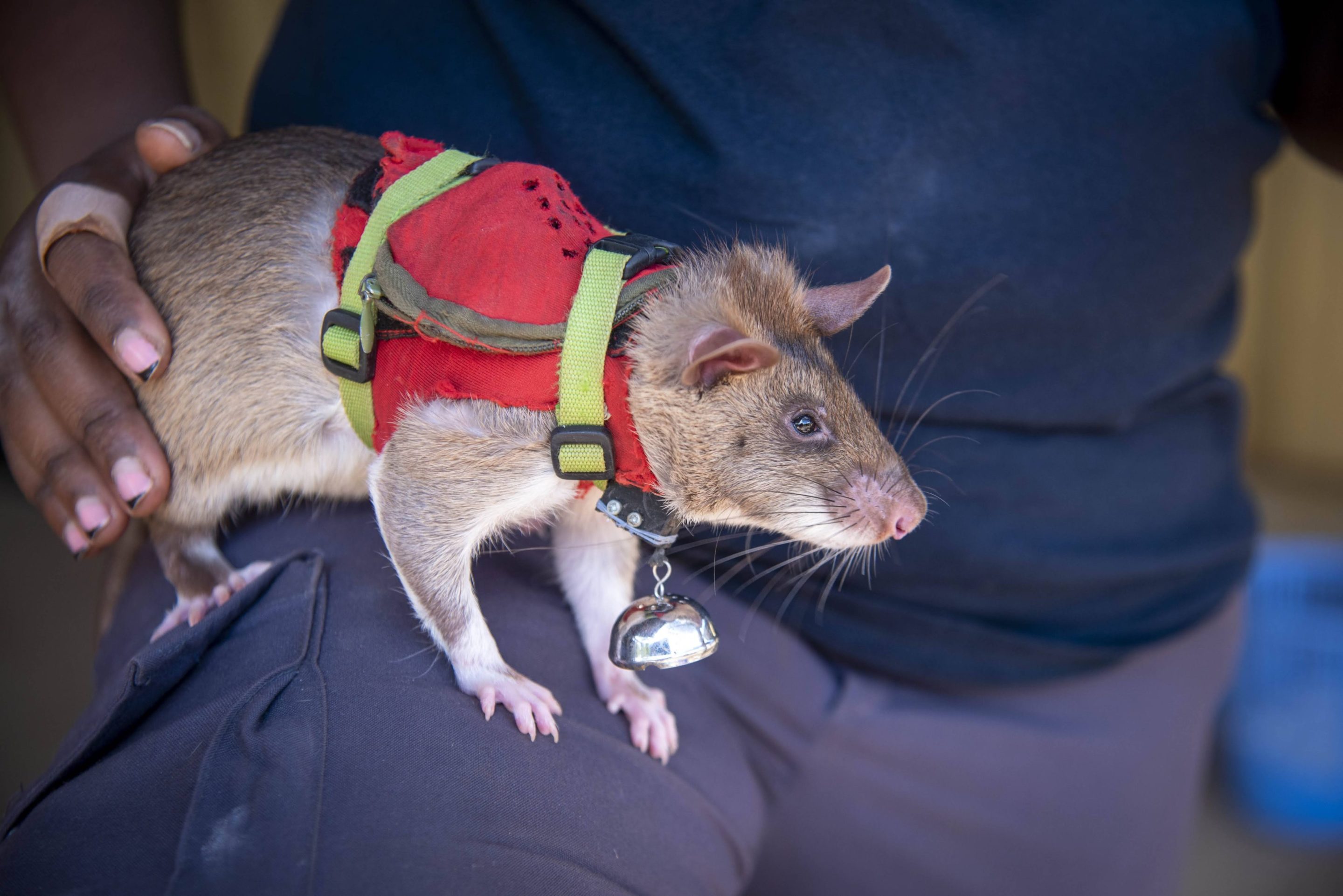Species around the world are threatened by the illegal wildlife trade, which peddles in wares such as pangolin scales, elephant tusk, rhino horn, and rare woods. Smugglers stow these artifacts, or even the wildlife themselves, inside large shipping containers, which are too expensive and time-consuming to scan with an X-ray. To help sleuth out these objects, scientists at the Belgian nonprofit Anti-persoonsmijnen ontmijnende product ontwikkeling (which roughly translates to Anti-Personnel Landmines Removal Product Development, or APOPO in Flemish) are turning to a rat with an extraordinary sense of smell. Giant African pouched rats have been trained to sniff out landmines in the ground, tuberculosis in mucus samples, and even survivors in disaster zones. Can the eight trained rats of APOPO—Marty, Attenborough, Irwin, Betty, Teddy, Ivory, Ebony, and Fossey—rise to the occasion, and help stave off their neighbors' endangerment, or even extinction? We sat down with Ivory, who lives in the town of Morogoro in Tanzania, to learn about the smell of poaching, her itty-bitty uniform, and what kind of treats she likes most as a reward; here's how she gets it done.
On carving her own path:
My parents were surprised, and probably a little disappointed, when I took this gig. They always wanted me to take over the family business sniffing landmines in Siem Reap. It's noble work, but I'm not really an adrenaline junkie, and my dad's footsteps felt too way too big for me to fill. He was the first rat to win the animals' George Cross, a gold medal awarded by the People's Dispensary for Sick Animals, for his bravery sniffing the landmines, and he would never let you forget it. But what did my parents expect me after naming me Ivory? Not even us rats can escape nominative determinism, I guess.
A lot of people thought the scientists would pick dogs for this line of work. For one, they're a lot cheaper than X-ray scanners. But dogs are total wusses without their handlers, and they're too big to scuttle between tightly packed boxes in shipping containers. And have you seen how much they eat? We rats may not have good eyesight, but we are smaller, and our olfactory receptor repertoires and olfactory bulbs are nothing to scoff at. Plus, we can live for up to nine years, which means my career is only just beginning. Maybe in five years I'll be managing a team of rats! That would show my parents...
On learning to sniff:
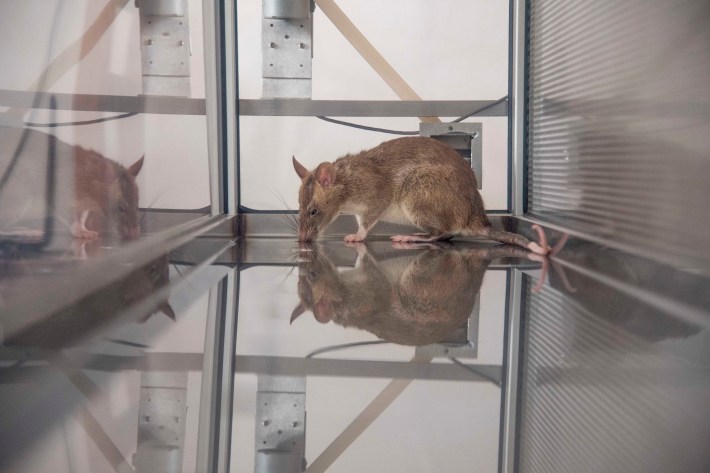
My cohort of rats started training after we turned 1. We started out as a group of 11: me, Kirsty, Marty, Attenborough, Irwin, Betty, Teddy, Ebony, Desmond, Thoreau, and Fossey. Kirsty had some health issues and had to drop out, and Thoreau and Desmond unfortunately passed away due to unrelated health issues during training, so we ended up as a class of eight.
At first it felt a little like college—we were all in singles or doubles with the basic things a rat needs to get by, like a clay sleeping pot, a wooden structure for climbing and gnawing, some wood shavings, and and bottomless refills of drinking water. I would enter the training box, which had 10 holes in the ground. I sniffed the holes one-by-one. If I thought a hole smelled like something that might be smuggled, like pangolin scales, African blackwood, rhino horn, or elephant ivory, I'd hold my nose inside the hole for three seconds—that's what the scientists call a "nose poke." If I got this right, I'd hear a click and get some rat chow.
Thankfully we got weekends off, so I got to rest and recharge with some "me time." I love to stuff my face with some local delicacies like banana, cucumber, and sun-dried fish. And I mean that literally—I can store a golf-ball's size of treats in each cheek. They don't call us pouched rats for nothing! It's also really important to me to get my 18 to 20 hours of beauty rest.
On the scent of poaching:
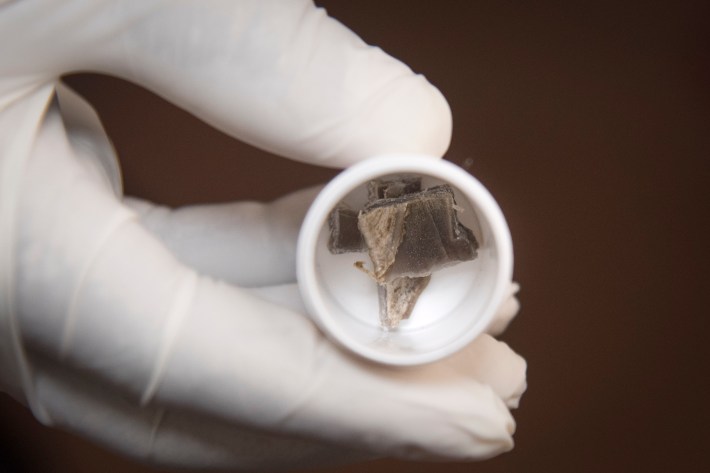
The scientists threw in plenty of other smells to throw us off, like electric cables, synthetic socks, coffee beans, laundry detergent, raw peanuts, and some various seeds. These other scents felt kind of random to me, but Betty told me that these are actually items that poachers use to hide the scent of their goods in the real world.
As a young pup, I obviously knew about elephants and rhinos. They're kind of famous in the animal kingdom. But I had never heard of a pangolin before starting this job. When they showed us a photo, I couldn't believe my eyes. You're telling me that's a mammal like me? It looks like a Pokémon. Covered in sharp scales and can roll up into a little ball like a pill bug, and their tongues are just as wild—long, noodly things that slurp up ants and termites. Apparently some people consider their meat a delicacy and use their scales in traditional medicine. I kind of get it. The creature looks too magical to not have some kind of special power. But if I ever saw a pangolin in the wild, the last thing I'd want is to kill it.
I wonder if my dad ever saw pangolins when he worked in Siem Reap. There are so many things I wish I'd asked him before he passed away. Oh, he didn't step on a landmine or anything, just died of natural causes. But you don't think about these things when you're young, right? You think your parents will be around forever.
On her organizational hacks:
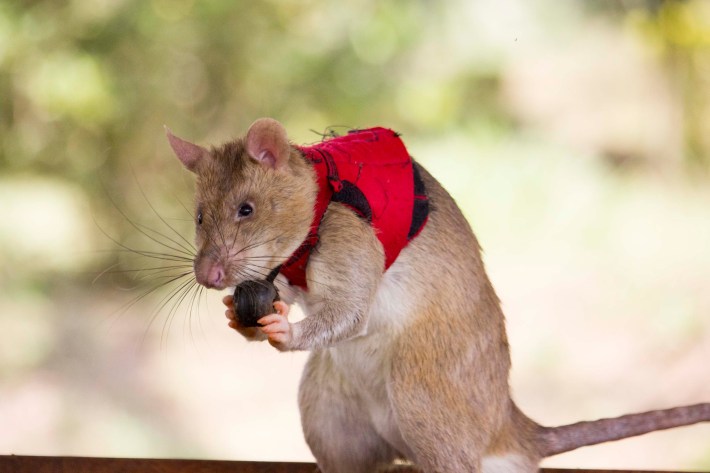
Not all scents are equal. Rhino horn was really pungent, so we only needed 22 sessions to master that scent. Pangolin and wood were much trickier, and we needed 172 sessions to get that down. But sniffing out individual scents was just the foundation for our work. The next stage of training consisted of detecting these scents when mixed together with other items, both wildlife targets and unrelated scents. The odors were overwhelming, but we had to rise to the occasion. Unfortunately for me, no poacher is smuggling their ivory in a neat row of 10 holes.
No rat is an island, and everyone makes mistakes. The scientists found that we actually work better in teams, and that when a sample is sniffed by two rats, we were able to sleuth out 100 percent of our target samples with a paltry increase in false alarms. This was no surprise to me; I've always been more productive on group projects. And not to be all girl-rat-boss, but researchers recently published a study on giant African pouched rat personalities, looking into how 25 rats exhibited behaviors related to anxiety, exploration, and locomotion. They found female rats show more exploratory behavior than male rats, which may make us better investigators. That's right! If we get to pick our partners, I want to work with Betty.
When we do go into the field, we'll each be wearing bespoke vests. It's a really effective uniform with a gorgeous pop of tomato red. Jonathan Anderson, if you're reading this, would you consider a collab? Loewe x APOPO would be iconic, and I know I'd look great sniffing that tomato candle.
On managing her mental health:

Work like this can feel like a burden. Every time I huff the musk of an elephant tusk, I think about how that elephant died—hunted and killed and left to rot, leaving behind a whole elephant community to mourn them. It makes me furious, and at first I tried to let that rage fuel my work. But I've learned that it's not sustainable to be consumed by that stress and anger every day and have no emotional bandwidth left for myself. I'm a rat, so I can't travel or go to a spa or any of the typical self-care things that everyone suggests. So I had to ask myself, what's the rat equivalent of a trip to Italy or a day at the spa? For me, that answer is kicking back with Betty in our enclosure, climbing and gnawing on our wooden climbing/gnawing structure, and gossiping. Since we're a cohort of just eight rats, there are a lot of ... entanglements, if you catch my drift.
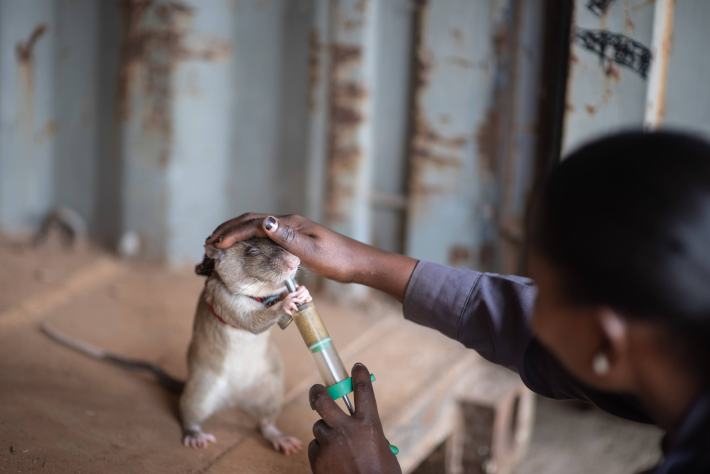
On setting her own expectations:
As an APOPO giant African pouched rat, there can be so much pressure to succeed. I mean, they even call us HeroRATs. That label can feel overwhelming, especially when your day-to-day looks like sniffing 10 different holes in a box. No one ever doubted that my dad was a real HeroRAT—I mean, he detected more than 100 land mines and other unexploded ordnance, probably saving countless beings that would have waddled unknowingly over that dirt. Honestly, even detecting a single landmine makes you a hero in my book.
I guess I don't feel like I can call myself a HeroRAT, at least not yet. I haven't even had a chance to prove myself in the field, sniffing out real wares from real smugglers. Sometimes I worry I'll choke under the pressure, or my nose will stop working. But whenever I start spiraling, I remind myself to take deep breaths. I remind myself that even if I never go into the field, maybe I will have helped pave the way for other, future rats to go out there and prevent the deaths of elephants, pangolins, rhinos, and trees that I will never meet but still want to know are thriving. Even though I grew up in a lab, I still want to be in community with wild species, and I think my work builds that connection.
Sometimes I think about all the other giant African pouched rats that live in the wild and don't have jobs. What would my life be like if I was born one of them? Maybe I'd feel more free, or maybe I'd feel bored. I definitely wouldn't have access to my weekend banana smoothies. I can't dwell too much on it, though. I am only one rat, with only one life. So I've got to live it.
